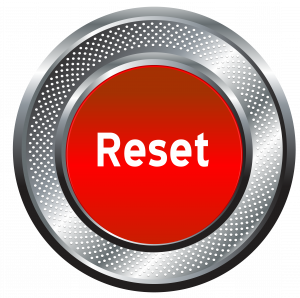There are stormy times ahead.
Driving safely through a storm requires that you change how you drive; you have to stay alert and adapt to the shifting conditions.
I recently thought I need to NOT run into the storm that’s ahead without taking stock. I need to stop and think of my direction. In my mind, I’ve pushed the Reset button.

The economic and living conditions are constantly shifting and uncertainty abounds. If you’re doing the same things you did when it was nice and sunny, you’ll likely crash. My suggestion is you may need to change your approach.
Change doesn’t mean doing more of the same: selling harder, working longer hours, being more aggressive. That won’t help.
If you change your approach, not only can you succeed in this moment, you will have expanded your ROM which is Repertoire of Movement. And a wider ROM will mean a better, more effective, more resilient business. And more capable, happier people.
Now here’s where my thinking gets a little opposite to the normal. Most people will say be consistent.
I say let that go and be like the changing times we are in. Try to be inconsistent. The business world is always changing. That means there’s no simple formula that will get you through every situation you encounter.
But maybe there’s one!
Before you do or say anything, ask yourself three questions:
- What’s the situation? – Think of the outcome you want to achieve? The risks? The time pressures? The needs?
- Who else is involved? – Think what are their strengths? Weaknesses? Values? Vulnerabilities? Needs?
- How can you help? Think what are your strengths? Weaknesses? Values? Vulnerabilities?)
 Do this as part of your Reset. Select an answer that leverages your strengths, meets people where they are, and is appropriate to the situation you’re in.
Do this as part of your Reset. Select an answer that leverages your strengths, meets people where they are, and is appropriate to the situation you’re in.
Let me give you some further thinking on this. Take our current economic environment. What’s the situation? In an era when all sizes of businesses are faltering, the new competitive advantages are trust, reliability, and relationships.
Who else is involved? Think about your clients, prospects, and employees. What are they looking for now? Where are they vulnerable? What support do they need?
How can you help? What can you offer that will support others at this time?
Once you’ve thought this through in general, apply it in real-time when specific opportunities present themselves. For example, let’s say a client wants to cancel part of a project he or she had previously committed to.
You’ll have an immediate, instinctive reaction. Maybe you desperately need the money to stay profitable. Maybe you believe that contracts should never be broken. Maybe you don’t trust your client and think you are being taken advantage of.
But before you act instinctively, push the PAUSE button. Ask yourself the three questions. What’s the outcome you’re trying to achieve? Immediate money? A long-term relationship? Respect in the industry? Something else?
Trust is key
Knowing that trust is the new competitive advantage, you might choose a different response. Maybe you give the client some wiggle room. Which, perhaps, is not your natural, habitual reaction. But you realise it shows understanding, which builds trust and the relationship, which, in these economic conditions, is a great investment.
Then you discover something else. A hidden gift in an otherwise depressing economy. Your client put you in a tough spot and you rose to the occasion, showing true character, which created a deeper relationship. When the economy improves, chances are, you’ve got a client for life. A devoted fan, maybe even a friend, who will refer you to many other clients, because you took a chance for him or her.
This is the exciting part. That opportunity would never have presented itself if the economy hadn’t turned bad, if the client didn’t need a favour, and if you didn’t pause, understand the opportunity, and take a chance.
This economy is an opportunity to forge relationships that will last for decades. This is the time to build your business with deep, committed, loyal employees, customers, and partners.
Reset. Pause. Ask the three questions.

Leave a Reply